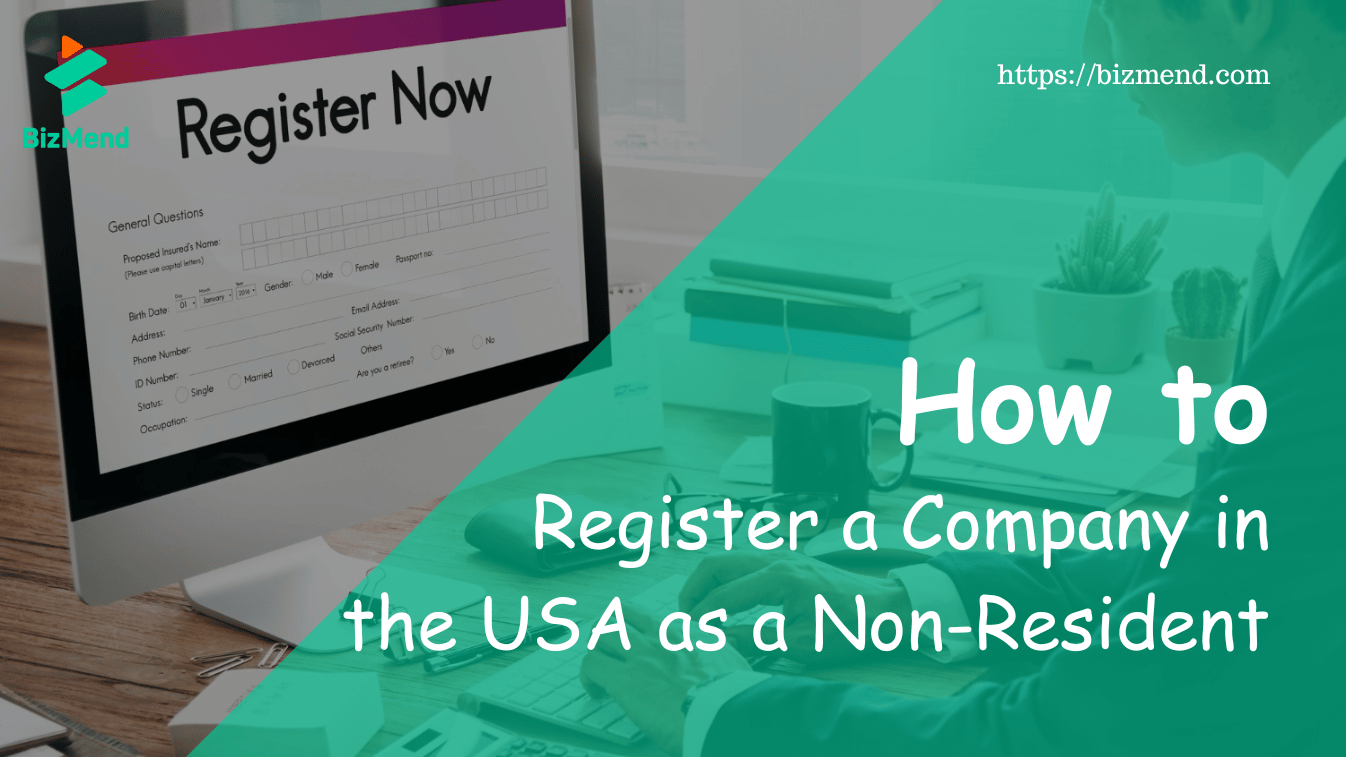“You don’t need a visa. You don’t have to move to the U.S. All you need is the right setup, a clear direction, and a real drive to grow.”
You’re Not from the US, But You’re Ready to Build Your Future Here.
It doesn’t matter where you live. If your customers are in the U.S., or your payments need to go through popular and most accepted payment gateways (Stripe, PayPal, etc.), or your brand needs a structure that’s recognized globally—a U.S. company registration just makes sense for non-resident founders.
You don’t need to live there. You don’t need to visit.
You just need to know how the system works—and how to follow it without overcomplicating everything.
This blog walks through how to register a company in the USA as a non-resident, what to expect, what to avoid, and what makes this structure hold up when it matters.
Before You Begin: Ask Yourself These 5 Questions
Starting a company in the U.S. from abroad is possible—but it isn’t for every kind of business or founder. Before you even think about registration, ask:
- Are you trying to use U.S.-based platforms like Stripe or PayPal for your business?
- Is your target audience U.S. customers or clients?
- Are you operating remotely or will you have a team in the U.S.?
- Are there tax treaties between the U.S. and your country? Can you handle the early tax and filing duties right from where you are?
- Got someone you trust to handle the paperwork, or planning to take it on yourself?
If you’re finding yourself nodding yes to most of these, you’re good to go.
What You Need Before You Even Apply
Here’s what you’ll want lined up before you touch any registration form:
- A business name (check availability in your chosen state)
- A valid passport
- A clear understanding of your business model
- A U.S.-based registered agent
- A mailing address (can be virtual)
- Patience for EIN processing, if you don’t have a Social Security Number
- Someone who can help with Form SS-4 (if you’re doing it without an SSN)
Also helpful:
- A draft Operating Agreement (if forming an LLC)
- An idea of how you’ll get paid (Stripe, PayPal, wire transfer, etc.)
- Where you’ll open your business bank account
This is your pre-launch checklist. Treat it like a warm-up before stepping onto the field. And, you don’t need a lawyer. But you do need clarity. And sometimes it’s okay to ask for help; reach out to a professional for more clarification.
Step-by-Step to Register a Company in the USA as a Non-Resident
Let’s start on those steps:
Step 1: Choose the Right Structure
In the U.S., you’ve got a few options:
- LLC (Limited Liability Company) – flexible, popular, ideal for non-residents
- C Corporation – good for fundraising, more formal
- Sole Proprietorship – not available for non-residents
- S Corp – only for U.S. citizens or SSN holders
For most non-residents, the answer is simple: LLC.
(Still not sure? See the Difference Between LLC and C Corporation in the U.S.)
Step 2: Pick Your State
No, you don’t have to register where you live. You’re not in the U.S.—you have the freedom to pick based on logic.
Most non-residents choose:
- Delaware (global trust, legal clarity)
- Wyoming (lower cost, higher privacy)
- California (only if you’re physically operating there)
Still comparing? Have a look at the following insightful guides:
- Why Many Foreigners Choose Delaware for Their LLC
- Why Start Your Company in Wyoming: Pros & Cons
- California LLC Formation Requirements Explained
Step 3: Appoint a Registered Agent
Every state requires one. This person or company:
- Receives legal documents on your behalf
- Must be physically located in the state where you form your company
- Must be available during U.S. business hours
This isn’t optional. Without a registered agent, your LLC filing will be rejected.
Step 4: Register the Company
Now you’re all set to file your Articles of Organization (for an LLC) or Certificate of Incorporation (for a C Corp).
It includes:
- Your chosen company name
- Your registered agent’s information
- Your management structure
- Your business purpose
Once the state accepts your filing, your company legally exists.
Step 5: Apply for Your EIN (Tax ID)
This is the step that trips up most non-residents.
- If you don’t have a U.S. Social Security Number, you’ll apply for your EIN by fax or mail (using Form SS-4)
- Processing takes 1 to 4 weeks
- This number is required to open a bank account, use Stripe, and file taxes
Pro tip: Apply for this immediately after your company is formed. Don’t wait.
Step 6: Open a U.S. Business Bank Account
Once you’ve got your EIN, you’re all set to open your U.S. bank account.
This is essential if:
- You’re selling in USD
- You want to use Stripe, PayPal, or Amazon
- You want to keep business finances clean
Most non-residents use:
- Mercury
- Relay
- Wise (for transfers and currency conversion)
Traditional banks will usually require an in-person visit.
What Happens After You Register?
This is where most non-residents drop the ball. The company is registered—but compliance hasn’t even started.
Here’s what you still need to do:
- File annual reports (depends on state)
- Pay state taxes (like Delaware’s $300 franchise tax or California’s $800 flat fee)
- File federal tax returns—yes, even with $0 income
- Keep your registered agent active
- Maintain clean bookkeeping
If you don’t do this, your company can fall out of good standing—affecting your banking, platform access, and tax situation.
Can You Register a Company from Bangladesh, India, or Anywhere Else?
Yes.
In fact, many founders from Bangladesh, India, Pakistan, Nigeria, and Brazil now run U.S.-registered companies remotely. All legally.
The U.S. system doesn’t require:
- A visa
- Physical presence
- U.S. citizenship
- A Social Security Number (for forming the company)
But it does require:
- A registered agent
- A valid passport
- A structure that makes sense for your business
- A plan for taxes and renewals
- A mindset for staying compliant with both federal and state laws
If you’re just getting started, read What Is a Sole Proprietorship in the U.S.? for contrast. Or check out How to Form an LLC in Delaware: Step-by-Step if you want the smoothest path forward.
Final Thought: Don’t Just Register It. Run It Right.
The paperwork is simple. The filings are clear.
But what makes a U.S. company work long-term has nothing to do with the state you picked—and everything to do with how you manage it after formation.
Structure. Clean filings. Real compliance.
That’s what earns you trust—with platforms, partners, and clients who don’t ask where you’re from—just whether you’re showing up like you belong here.
So register it properly. Keep it clean. And build it like you’re planning to stay. For real.
FAQs of USA non-resident Company Formation
Can I start a U.S. company even if I don’t live there?
Yes. You don’t have to live in the U.S. or be a citizen. You just need a U.S.-based registered agent, a mailing address, and a few key documents. That’s it.
Do I need a visa to start a U.S. company?
No. Business registration and immigration are two separate things. You can fully own and operate a U.S. company without holding any U.S. visa or green card.
What kind of business structure should I choose as a non-resident?
For most non-residents, it usually comes down to choosing between an LLC and a C Corp.
- LLC is flexible, simple, and works well for small to medium operations.
- C Corp is ideal if you’re planning to raise funds or issue stock.
You can’t form an S Corp or sole proprietorship as a non-resident.
Is it possible to open a U.S. bank account without going there?
Yes. Services like Mercury, Relay, and Wise let non-residents open U.S. business accounts remotely once your LLC is formed and EIN is approved.
Is it possible to get an EIN if I don’t have a Social Security Number (SSN)?
No. If you don’t have an SSN, you’ll need to send in Form SS-4 by fax or mail to get your EIN. The process takes a few weeks but works.
How much does it cost to start a company in the U.S. as a non-resident?
Depends on the state. Typically:
- State filing: $70–$150
- Registered agent: $50–$150/year
- EIN: based on the service provider and the timeframe
- Annual state fees (like franchise tax): $60–$800, depending on state
Do I need to file taxes even if my company made no money?
Yes. Even if your U.S. company didn’t earn a dollar, you’ll still need to file federal tax forms—like Form 1120 or 5472 + 1120 for single-member LLCs.
Which U.S. state is the best choice for non-residents to register their company?
Most choose:
- Delaware – if you want credibility and long-term flexibility
- Wyoming – if you want privacy and low cost
- California – only if you’re actually doing business in the state












